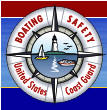
As we head into the fall boating season, closer attention to cold weather boating safety guidelines is a must. With the cooler weather comes colder waters!
Here’s some tips from our friends at the US Coast Guard.
When the weather changes so should the type of lifejackets boaters use such as a flotation coat or deck suit-style designed to keep the boater afloat and insulated without using energy. If a person were to fall overboard in cold water, hypothermia sets in and their chances of survival decrease drastically…and quickly! Bringing extra layers of clothing and weather appropriate outerwear is crucial. Depending where you live temperatures can average in the 50’s throughout October and November. Make sure when you head out on your Fall boating adventure you are prepared for sudden drops in temperature or approaching storms.
A safety check of your vessel ensures that it is outfitted with the proper safety gear and is in good operating condition before getting underway.
The following is a list of safety tips all boaters should adhere to before leaving the dock:
- Carry a VHF-FM marine radio. Cell phones often lose signal and run out of batteries after a day on the water. They are helpful, but not reliable for emergencies.
- Register your EPIRB. Response time is the key to survival. The sooner help arrives, the better the chances for survival. Emergency Position Indicating Radio Beacons (EPIRBS) provide the fastest and most accurate way the Coast Guard has of locating and rescuing persons in distress.
- Have a Vessel Safety Check. It’s a great way of learning about problems that might put boaters in violation of state or federal laws, or create danger for boaters and passengers on the water. Best of all, it’s free! Both the U.S. Coast Guard Auxiliary and the United States Power Squadrons have certified vessel examiners who will perform a free Vessel Safety Check (“VSC”) at your boat, at a time of mutual convenience. There is no charge, and no consequences if you don’t pass. Our goal is simply to help make boating as safe as possible for you, your family and your friends, through education.
Before getting underway let friends and family know where and their expected return time. These planned actions ahead of starting the motor, hoisting the sail, or paddling the vessel are critical to ensuring a safe boating excursion or rescue if the need arises